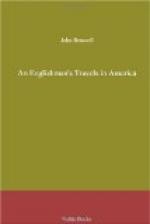This would-be patrician was a pedantic, swaggering bully, who, it was evident, entertained high notions of his importance, and owned, perhaps, large possessions,—in a word, he was an American aristocrat, and the description I have given is a fair one of his class in the south. Pointing to a hill, as we entered a little settlement on our way to Macon, he exclaimed, “See there, gentlemen, twenty years ago I toiled up that hill without a cent in my wallet (purse), but now” he continued, with the air of a potentate, “my niggers are the sleekest in our country. In those days,” he went on, “glass inkstands stood on the desks of the bank I now am chief proprietor of; we have nothing but gold ones now.” The fellow’s bombast lowered him in the esteem of the passengers, who seemed indisposed to listen to him, and the latter part of the journey he said little, being in fact regularly sent to Coventry by us all. He afterwards amused himself much to our annoyance by whistling airs and singing snatches of songs, which caused one of the passengers, a lady, to leave the diligence at the next change of horses. He was quite an adept at whistling the air of “Yankee doodle.” This want of deference to the sex, which I must say is an exception to the general behaviour of men there and in other parts of the Union I visited, did not fail to call forth animadversion; the remarks at one time being so pointed, that I began to feel uneasy lest the pugnacious spirit might be aroused in him, which leads so often in the south to serious encounters.
Our conveyance, which more resembled a waggon than, a stage-coach, having by this time stopped at a large hotel at Macon, I alighted with much pleasure, for the roughness of the road, the disagreeable loquacity of the passenger I have described, and the recklessness of the driver, made the journey excessively unpleasant.
The negro population in Georgia is very numerous, and their constant attempts to escape to the everglades in Florida, make unceasing vigilance on the part of their owners necessary for the safety of their property. In many instances where suspicion exists, they are never allowed on any pretence, to leave the estate or residence of the owner.
At the Greensborough Railway Terminus, I noticed two negroes on their way to Charleston. Before being allowed to take their seat in an open carriage in the rear of the train, the clerk at the station stepped up to them, and with an air of great effrontery demanded to see their passes; these were instantly shown with an alacrity that plainly indicated fear; they were then shut in a box in the rear of the train, in which I could see no sitting accommodation. The way in which these men were treated presented nothing new, for I had invariably noticed that coloured people in the south, whether bond or free, were spoken to with supercilious haughtiness, which I never once saw them openly resent.
On arriving at the next station a trader got into the carriage. He had with him two negro men and a boy; these were secured to each other by hand-cuffs and a slight negro chain.




